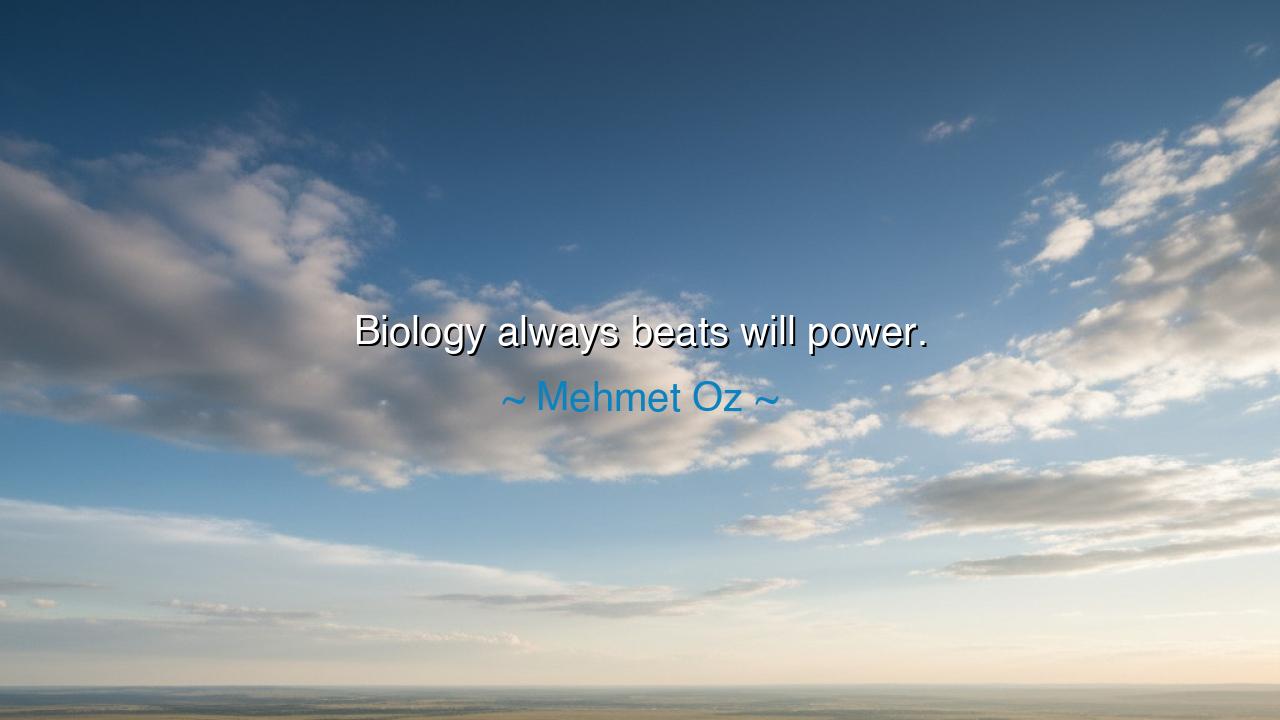
Biology always beats will power.






Mehmet Oz, physician and speaker of truths about the body, declares with sobering simplicity: “Biology always beats will power.” In this saying lies the reminder that man, however noble his aspirations, remains bound to the laws of flesh and blood. Biology—the rhythms of hunger, fatigue, desire, and survival—shapes us with a strength deeper than mere resolve. The proud may boast of will power, but when set against the ancient currents of nature, the will is often overpowered.
The meaning is not despair but wisdom. To know that biology surpasses will power is to recognize that discipline begins not with denial of the body, but with understanding it. One who seeks to master himself must first learn the limits and needs written into his frame. To ignore these laws is folly, as if a sailor tried to command the wind. But to know them, to work with them, is to find true strength, for wisdom aligns will with nature rather than setting it in futile opposition.
History offers a clear mirror in the story of Mahatma Gandhi. His fasts were legendary, a triumph of spirit over appetite. Yet even Gandhi, when he pushed beyond the body’s limits, required intervention, for his mortal frame could not transcend biology indefinitely. His greatness lay not in pretending that the body could be forgotten, but in harnessing its suffering as a testimony of faith. Thus, his will power inspired millions, yet it always moved within the boundaries set by flesh.
This truth also humbles the modern world. Countless souls attempt to conquer biology through sheer resolve—ignoring sleep, scorning rest, denying hunger, or overindulging desire with the hope of mastering it. Yet again and again, nature asserts its dominion. The body falters, the mind weakens, and the proud are brought low. Such is Oz’s warning: to fight biology as an enemy is to wage a battle already lost.
Therefore, let the seeker of wisdom remember this: the path to mastery is not in crushing biology with will power, but in uniting them. Feed the body rightly, honor its rhythms, and the will is strengthened rather than broken. For nature is no adversary but a teacher, reminding us that we are not gods, but mortals—creatures of flesh, yet capable of greatness when we walk in harmony with the laws that formed us.






TTTrang Thach
This quote makes me think about how much control we truly have over ourselves. It’s almost unsettling to imagine that the body’s instincts could override even our strongest intentions. But maybe that’s not entirely negative—it could be a reminder to listen more closely to what our biology is telling us. Does mastering willpower really mean suppressing instinct, or learning to cooperate with it in a healthier, more sustainable way?
VQLa Vinh Quoc
I can’t help but feel conflicted about this claim. On one hand, it’s empowering to recognize that biology influences our cravings, emotions, and energy. On the other, it feels like an excuse for giving up—like saying we’re not responsible for our choices. How do we find balance between compassion for our biological constraints and accountability for our actions? Maybe the truth lies in learning to work with our biology instead of fighting it.
TTthaigiam123 tong
This idea strikes a nerve because it touches on the struggle so many people face with habits, addiction, and self-control. If biology always wins, how do we account for people who radically transform their lives through persistence and mental strength? Maybe biology sets the boundaries, but willpower operates within them. I’d love to know if Oz meant this as a warning about respecting the body’s limits or as a challenge to understand them better.
RMRK MSMR
I find this quote fascinating because it challenges the common belief that determination can conquer anything. It’s almost humbling to think that our bodies have a stronger say than our minds. But at the same time, doesn’t neuroscience show that willpower itself is a biological process? Maybe it’s not a fight between biology and will, but a question of aligning them. Could understanding our biological limits actually make us more successful in changing behavior?
MDtran trang mong diep
This statement feels both brutally honest and slightly discouraging. It makes me wonder—if biology truly overpowers willpower, does that mean personal discipline is ultimately an illusion? I get the scientific logic behind it, but it also seems to diminish the human capacity for change. Are we just victims of our genetic and chemical makeup, or can awareness of our biology actually help us reshape it through smarter choices and habits?